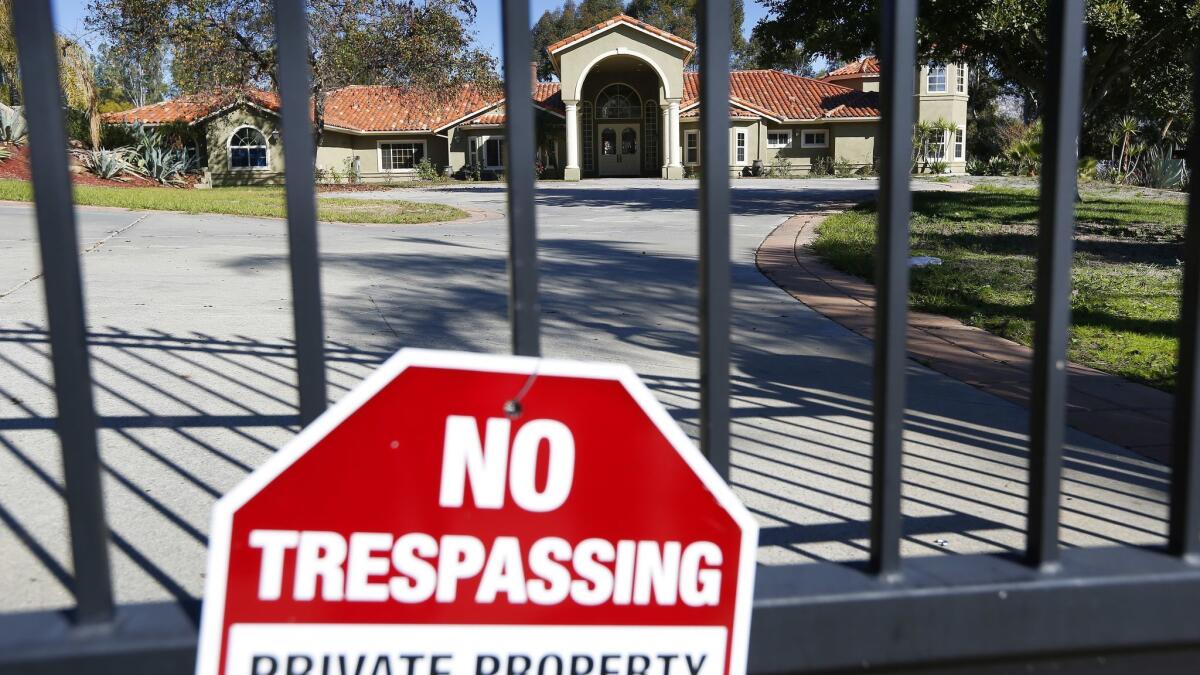Stealing home? Tony Gwynn’s former Poway home occupied by someone squatting in style

- Share via
Poway — Neighbors of the late San Diego Padres great Tony Gwynn noticed something strange happening in their upscale Poway neighborhood about two weeks ago.
Last summer, the Gwynn family lost their home to foreclosure and it’s been vacant ever since. But suddenly in late December, neighbors told the Sheriff’s Department that they had noticed people coming and going frequently from the fenced-off multimillion-dollar residence. One neighbor spotted barrels being loaded into the garage, leading to speculation that a methamphetamine lab might be setting up.
Now, officials with the property management firm responsible for the bank-owned property have confirmed that the man living on the property was squatting illegally in the residence and have begun civil eviction proceedings against him.
Valued at about $2.3 million, the house went into foreclosure in June and is now owned by a New York bank and managed by Ocwen Financial Corp. in Florida. Ocwen spokesman John Lovallo confirmed that it has taken action to evict the man.
“(Ocwen) recently was made aware that an unauthorized person was occupying the property,” Lovallo said in a statement. “We are currently investigating this information and will take all necessary steps under the law to remove an unauthorized person(s) from the property. We will cooperate with local authorities on this matter.”
Last weekend, a Poway Sheriff’s Department sergeant made contact with the man in the home. He told the officer he had the legal right to be there but nevertheless indicated he would be moving out. The man, who officials have not named since he has not been arrested, refused to comment when approached by a Union-Tribune reporter at the locked gate of the home on Tuesday.
On Tuesday, there were three vehicles parked in the home’s driveway. But on Wednesday, there were none and by late afternoon, the padlock and chain the resident was using to secure the property had been removed and a new one had replaced it.
Sheriff’s official say they were limited in what they could do without authorization from the home’s owner.
“We want to address the neighbor’s concerns, but we can’t just knock down the doors,” Poway Sheriff’s Lt. Christopher Collier said. “There are laws that we have to abide by and facts that have to be checked out.”
Collier said the man told the sergeant that he had paid $24,000 to a man named Smith to lease the house for a year. However while talking to the sergeant the man indicated he intended to move from the property soon. Neighbors told deputies the man’s story of how he had come to be in the house had changed over the past few weeks.
“He is claiming he has the right to be there, but he also doesn’t seem to want to be in the middle of this and is saying he will move out this weekend,” the lieutenant said.
“If he doesn’t move out, we may have to pay a bit more attention to that address,” he said Tuesday. Wednesday Collier said it would be good news if the property has been vacated.
Bob Manis, the city’s director of development services who oversees Poway’s code compliance team, said the city also received complaints. He also said one of the worries concerned the barrels being moved into the garage.
A spokesman for the neighbors declined to comment.
Manis said that as far as the city is concerned, there have been no code violations. He said apparently there is no trash service at the house. Should trash begin to pile up on the property, for instance, then code compliance officers could take action. Electricity, cable and gas had been turned on at the house in recent weeks, authorities said.
The 7,630-square-foot, six-bedroom, six-bath house located about two miles west of Lake Poway on Boulder Ridge Lane, was built by Tony Gwynn and was the family’s home from 1991 until last year when it was foreclosed upon. A large bronze sculpture of Gwynn was erected last year at Lake Poway in his memory and a section of Interstate 15 directly to the west of the house is dedicated to the baseball star.
Gwynn, a member of baseball’s Hall of Fame and the San Diego Padres greatest hitter, died in 2014 at the age of 54 after having battled cancer for some time. His wife, Alicia, still lived in the house at the time of the foreclosure. The property went to auction in June but there were no bidders. Ownership then reverted to the bank that held the lien on the property, American Home Mortgage Assets.
At the time of the foreclosure, more than $2.5 million was owed.
Alicia Gwynn moved out a short time later and the house had sat vacant until recently. Collier said the man has been in the house for at least a few weeks and told the sergeant he had been there for more than two months.
Collier said squatter cases are legally problematic and complicated.
“It’s not like we can go to a house if someone’s been there a month or two, knock on the door and say you’re not living here lawfully and your under arrest,” Collier said. “It becomes a civil process.”
So-called “squatter’s rights” in California can be complicated and vary from case to case. One of the ways a person can get possession of a property is if they have openly occupied the home for at least five years and act like how an actual owner would. That might involve paying property taxes or a homeowner association fee, and making repairs to the property.
That situation is incredibly rare, said Brad Weeks, an attorney at Charlton Weeks LLP in Palmdale. One of the main reasons it never happens is if a homeowner pays their property taxes, and gets a notice that it has been paid by someone else, it should alert the owner that something is up.
Rent is a little different. If the tenant paid rent for five years, and then tried to claim possession the month after stopping paying rent, he or she would have no claim, said an analysis of the law by the Legal Beagle website. But, if they stopped paying rent five years ago and stayed the whole time, then a legal case could be more difficult.
Weeks said the concept of the law goes back to English Common Law, which wants property to be productive. But, he said it did not seem like the person in Gwynn’s house was actually a case where any type of adverse possession applied.
“Someone broke into the bank’s home and is trespassing,” Weeks said.
However, he said law enforcement often doesn’t like to get involved if someone is illegally staying in someone’s home. Weeks said they prefer a court decide possession of the property, which can delay how soon a homeowner can get rid of an illegal tenant. That can often mean months of free rent for an illegal tenant and legal bills for a homeowner.
The large metal gates guarding the former Gwynn home was secured with a thick steel chain and padlock on Tuesday and Wednesday morning. However, by late Wednesday afternoon the chain and lock had been removed and replaced with a different lock similar to what bicycles use. A “No Trespassing” sign is attached to the gate.
On Tuesday, the resident was unlocking the padlock to drive off the property when he was approached by a Union-Tribune reporter. He quickly said “no comment” and when pressed, angrily said “what don’t you understand about no comment?”
He then drove away at an excessive speed on Lake Poway Road.
Collier said squatter cases, when people move into a vacant house without the legal right to do so, are not unusual. However he said such things usually happen in homes of far less value.
jharry.jones@sduniontribune.com; 760/529-4931; Twitter: @jharryjones




